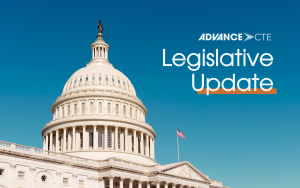
This week, the House Appropriations Committee marked up and advanced a federal fiscal year 2026 (FY26) Labor, Health & Human Services, Education and Related Agencies funding proposal. Elsewhere, the U.S. Departments of Education and Labor provided new details regarding their efforts to form a new “partnership” for workforce development as courts continue to block recent interpretive guidance regarding access to public benefits.
House Appropriations Advances FY26 Labor-HHS-ED Funding Proposal
This week, the House Appropriations Committee approved a FY26 Labor-HHS-ED funding proposal– legislation that would, if enacted, provide funding for the Carl D. Perkins Career and Technical Education Act (Perkins V) and other key education and workforce development programs. As shared last week, the measure proposes to increase funding for Perkins V’s state grant program by 1.7%, a $25 million increase over current enacted levels of investment. At the same time, the proposal would cut funding for Perkins V’s national activities account by nearly 20%, reducing funding for the account by $2 million overall.
While this proposed increase in funding for Perkins V’s state grant program is a welcome development, the measure envisions significant cuts to both the U.S. Department of Education (ED) and the U.S. Department of Labor (DOL), including drastic reductions and the proposed elimination of wider investments in K-12 education and workforce development.
The House Appropriations Committee held a protracted markup through late Tuesday night and into the early hours of Wednesday morning, where lawmakers on the panel approved the measure along party lines (35-28). Advance CTE and partners issued a statement this week in response to this latest step in the wider FY26 appropriations process. As a reminder, the Senate similarly passed an FY26 funding proposal earlier this summer. Lawmakers must still reconcile the significant differences between these two funding proposals before the end of the month– when the next federal fiscal year is set to begin.
As these efforts continue to move forward, Advance CTE will continue to advocate for robust funding for Career Technical Education (CTE) via Perkins V and other key investments in education and workforce development. To make your voice heard:
CLICK HERE TO CONTACT YOUR CONGRESSIONAL REPRESENTATIVES to advocate for investment in education and workforce development in FY26!
New Preliminary Injunction on PRWORA Interpretation
As Advance CTE has previously reported, several federal departments, including ED, issued new guidance related to the Personal Responsibility and Work Opportunity Reconciliation Act (PRWORA). This interpretive guidance implicates postsecondary CTE programs and dual and concurrent enrollment initiatives funded by Perkins V, as well as adult basic education programs funded through the Workforce Innovation & Opportunity Act (WIOA). These new legal interpretations attempt to expand and redefine what constitutes a “public benefit” under these laws and PRWORA, to limit access for undocumented learners and individuals.
This week, the U.S. District Court of Rhode Island issued a preliminary injunction further pausing the implementation of this new legal interpretation in response to a lawsuit filed by 21 state attorneys general. The ruling reads in part, “The Court thus holds that including WIOA II and Perkins V’s nonpostsecondary programs under PRWORA is contrary to law, because it finds no support in the statute.”
This latest development temporarily halts the implementation of this new legal interpretation as this litigation continues to move through the legal system. In recent weeks, Advance CTE and its partners sent a letter to the ED, requesting further clarification on how to operationalize the new regulatory requirements placed on states and grantees. The Department has not yet issued a response to date.
ED-DOL Partnership Continues to Take Shape
This week, ED and DOL provided new updates regarding their efforts to transfer administration of Adult Basic Education (ABE) programs authorized under WIOA Title II and CTE programs authorized by Perkins V to DOL via a complex new bureaucratic structure bridging both departments. The new arrangement will detail the majority of ED’s Office of Career, Technical, and Adult Education (OCTAE) staff to DOL while establishing a structure for ED to reimburse DOL to help fulfill its existing statutory obligations regarding the administration and oversight of Perkins V and ABE.
Congressional appropriations leaders this week issued a statement highlighting the incongruence of these efforts with existing legislative requirements, saying, in part, “The steps this administration is attempting to take require an act of Congress, and to reiterate: no such act has been passed.”
Most notably, ED informed states late Wednesday that Perkins V and ABE formula funds would be unavailable as ED transitions states to a new grant payment system utilized by DOL. As communicated by ED, Perkins V grants awarded on July 1, 2024, October 1, 2024, and July 1, 2025, have been placed on a temporary stop payment effective at 9 p.m. ET this past Wednesday (September 10, 2025). ED has characterized this announcement as a pause during this period of transition in grant management services.
Throughout the week, ED has reaffirmed that the existing financial and performance requirements of Perkins and WIOA Title II will remain unchanged amid the new bureaucratic changes between federal Departments. According to a fact sheet released by the administration, “ED will maintain all statutory responsibilities and will continue its oversight of these programs” under this new arrangement.
Advance CTE continues to monitor these developments closely and is actively working to support states to avoid unnecessary disruption to the implementation of Perkins V that these efforts may cause.
OCTAE Rescinds Perkins V Guidance
Last month, OCTAE rescinded several existing program memoranda regarding CTE and Perkins V. These rollback efforts include guidance aimed at highlighting how CTE and Perkins V-funded programs can be leveraged to address teacher shortages, as well as available supports for reentry efforts. OCTAE also rescinded guidance documents related to how ABE funding can be used for childcare and transportation costs, along with a program memorandum regarding gender equity provisions required by the current Perkins V statute. A complete list of the rescinded guidance documents can be found in this memo.

